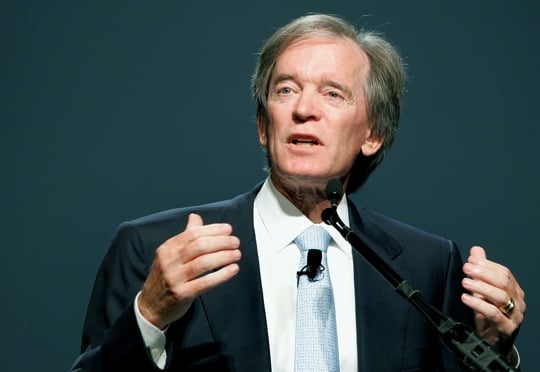Pimco's Total Return Fund moves to a negative holding in government debt; largest allocation in cash
Bill Gross, who runs the world's biggest bond fund at Pacific Investment Management Co., bet against U.S. government-related debt last month and boosted cash to be the largest of the Total Return Fund's holdings.
Pimco's $236 billion fund had minus 3 percent of its assets in government and related debt, after reducing the position to zero in February, the Newport Beach, California-based company said on its website. Cash and equivalents rose to 31 percent from 23 percent, making it the largest component for the first time in four years.
Gross has said he is concerned about what will happen when the Federal Reserve stops buying Treasuries, after the securities fell for a second quarter. The central bank implemented a plan in November to purchase $600 billion of debt by June 30 to sustain the economic expansion.
“Their objective obviously is to improve the economy and to create jobs, but also to put a floor under the stock market, and we know that's working,” Gross said April 1 in a radio interview on “Bloomberg Surveillance” hosted by Tom Keene. “The question remains, when the Fed stops buying Treasuries, does the private sector take the baton and run the last leg of the relay race?”
Cutting Mortgages
Gross lowered mortgage-related debt to 28 percent from 34 percent, according to the website. Investment-grade bonds comprised 18 percent of the fund's holdings, unchanged from February, the figures showed.
Treasuries fell today, extending a three-week decline, as economists said three government reports this week will show inflation is quickening. The securities handed investors a 2.8 percent loss in the six months ended March 31, according to Bank of America Merrill Lynch's Treasury Master index. The MSCI All Country World Index of stocks returned 14 percent in the period.
Longer-maturity bonds, those most sensitive to costs in the economy, are suffering the steepest declines. They also slid as the U.S. prepared to sell $32 billion of 3-year notes, $21 billion of 10-year debt and $13 billion of 30-year bonds in three daily auctions beginning tomorrow.
Ten-year Treasury yields increased two basis points to 3.60 percent as of 8:33 a.m. in London, according to Bloomberg Bond Trader. The 3.625 percent note maturing in February 2021 declined 5/32, or $1.56 per $1,000 face amount, to 100 6/32
Cost of Living
The Labor Department on April 15 will say the cost of living index rose 0.5 percent last month from February and was up 2.6 percent from March 2010, according to a Bloomberg News survey. Core prices, which exclude volatile food and fuel, climbed 0.2 percent for a third month.
Labor Department figures earlier in the week will show wholesale prices and the cost of goods imported into the U.S. also climbed. So-called producer prices rose 1 percent in March, while import prices increased 2.2 percent, surveys show.
The Total Return Fund appreciated 7.3 percent in the past year, beating 84 percent of its peers, according to data compiled by Bloomberg. Pimco is a unit of the Munich-based insurer Allianz SE.
Treasuries “have little value,” Gross wrote in his April investment outlook on the company's website.
The Total Return Fund can have a so-called negative position by using derivatives, futures or by shorting. Shorting is borrowing and selling an asset in anticipation of making a profit by buying it back after its price has fallen.
Government-related debt refers to sovereign bonds, Treasury Inflation Protected Securities, agency bonds, interest rate swaps, Treasury futures and options and corporate securities guaranteed by the Federal Deposit Insurance Corp., according to Pimco.
--Bloomberg News--







